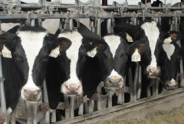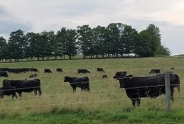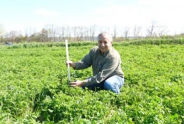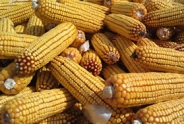African Swine Fever: What You Need to Know
Ashley McFarland, Area Livestock Specialist
Central New York Dairy and Field Crops
Pork is safe to eat. U.S. pigs are not affected by African swine fever (ASF) outbreaks in other countries, to date.
- ASF does not affect humans and therefore is not a public health threat according to USDA.
- ASF is a disease of pigs only and therefore is not a threat to non-swine pets or other livestock.
- As usual, the United States Department of Agriculture (USDA) has measures in place to prevent sick animals from entering the food supply, including if ASF is detected in the U.S.
- As with any food product, you should always follow safe handling and cooking instructions to protect your family's health.
- ASF cannot be transmitted to humans through contact with pigs or pork.
- ASF only affects members of the pig family.
- ASF can be transmitted to pigs through feeding of food waste containing contaminated pork products. The Swine Health Protection Act regulates the feeding of food waste containing meat to pigs to ensure that it is safe.
- ASF is transmitted to pigs through direct contact with infected pigs, their waste, blood, contaminated clothing, feed, equipment and vehicles, and in some cases, some tick species.
- Restrictions are based on USDA's recognition of the animal health status of the region and are enforced by the Animal Plant Health and Inspection Service.
- International travelers should be diligent in following all rules and regulations related to the U.S. Customs and Border Patrol reentry declarations.
- According to Dan Rock, Professor of Pathobiology, University of Illinois, most viruses demonstrate some degree of host restriction; they replicate in one cell type or host and not in another. While there are exceptions, this is the general rule, not the exception. In the case of ASF virus, there is no evidence supporting either subclinical or clinical infection of humans.
- The host restriction in ASF virus is likely due to the absence of susceptible and permissive cells needed for viral replication. It could also be related to the inability of the virus to overcome intrinsic and innate host responses generated following ASF virus exposure.
African swine fever virus is a contagious viral disease impacting only pigs, not people, so it is not a public health threat or food safety concern. The World Organization for Animal Health, of which the U.S. is a member, considers African swine fever to be a trade limiting foreign animal disease of swine. Countries with confirmed cases are subject to international trade restrictions aimed at reducing the risk of introduction of the disease through trade. The United States has never had a case of African swine fever and there are strict animal health and import requirements enforced by USDA APHIS Veterinary Services, USDA APHIS Plant Protection and Quarantine and Customs and Border Protection to prevent entry into the United States. There is a national response plan for African swine fever that has been developed by USDA Veterinary Services.
In response to the current situation in China and other countries, the National Pork Board has been working closely with the National Pork Producers Council, the American Association of Swine Veterinarians and the Swine Health Information Center to monitor the situation and collaborate with the USDA. The organizations are working collaboratively to gather intelligence, engage subject matter experts, assess risk and determine appropriate actions moving forward to address the issue. For more detailed information on African swine fever, visit Iowa State University's Center for Food Safety and Public Health.
Upcoming Events
IPM Strategies to Protect Corn and Soybean Seed in NYS
July 22, 2025
Cobleskill, NY
Free event. DEC Credits available
Clearing Hurdles to Improve Milk Quality Conference
July 22 - July 24, 2025
Rochester, NY
three day conference with short courses, seminars, and farm tours
Announcements
Sign Up for Our Weekly E-Newsletter
We send out a bi-weekly e-newsletter that has announcements, upcoming programs, and opportunities for you! Registration is quick, easy, and free. Click here to sign up today!Document and Share Storm Damage
Mother nature has really been difficult over the last few days. Significant damage has been seen throughout NYS. Please let us know what types of damage your farm may have sustained during this time. This could be in the form of property damage, lost power, milk dump due to lost power, loss of livestock, loss of stored feed or growing crops.Farms are encouraged to DOCUMENT AND SHARE any impacts the weather may have had on their home or business. This could include structure damage, crop loss, inventory loss due to power outages, damage to equipment or fencing, and more.
If your farm experienced any sort of damage, please reach out to any of the folks listed below (or all of them). The more impact information that is collected, the greater the likelihood of a disaster declaration which can bring vital emergency support and awareness. The CNYDLFC Team will continue to collect detail and submit to NYSDAM and the EDEN network.
Reporting Weather Related Impacts (For your home or farm business)
- First, ensure that all the people and animals on your farm are safe, and that there aren't any unsafe working conditions created because of the weather (check your structures!). If there's an emergency, call 911 - don't try to manage it all on your own.
- Second, document all negative weather impacts for your farm and their estimated financial cost. Take photos, make estimates, and put it all in a safe place.
- Reach out to your insurance providers - farm, vehicle, crop, etc. to initiate the claim process as needed.
- Then, share your farm's damage with any (or all) of the ag support agencies listed below. We all work together to collect storm damage information and funnel it up to Ag and Markets which can initiate a natural disaster declaration.
- Chenango: 607-334-5841
- Fulton/Montgomery: 518-853-2135
- Herkimer: 315-866-7920
- Madison: 315-684-3001
- Otsego: 607-547-2536
- Schoharie: 518-234-4303
- Saratoga: 518-885-8995
- Erik Smith: 315-219-7786
- Daniela Gonzalez: 315-749-3486
- Ashley McFarland- 315-604-2156
Your county USDA/FSA service center.
- Chenango: 607-334-3231
- Fulton/Montgomery: 518-853-4015
- Herkimer: 315-866-2520
- Madison:315-824-9076
- Otsego: 607-547-8131
- Schoharie: 518-295-8600
- Saratoga: 518-692-9940
Your county farm bureau manager
- Region 3: Bailey Coon: 518-937-0566
- Region 5: John Wagner: 315-761-9770
- Region 6: Natally Batiston: 518-937-0269
- Region 7: Todd Heyn: 518-431-9338
Please let us know how we can help you.
Cash Rent and Custom Harvest Survey
To date, there is limited information available about rental rates and fees for crop harvesting. Farms can use this valuable information for their farm business planning to help improve decision making and profitability.Farmers Can Join MeatSuite For Free!
MeatSuite.com is a free resource provided by Cornell University where NY meat farmers can create a farm profile and list their bulk (wholes, halves, quarters) and bundled (i.e. Grilling Bundle) meat products.Why should farmers join?
1. It's free and easy!
2. Connect with more local customers. In the past year the MeatSuite.com farm directory had 8,300 visits from New York consumers. Farm profiles get as many as 25 views per month from potential local customers. We also spotlight MeatSuite farms on social media and bring attention and purchases to farms through highlights and giveaways.
How do I join?
Farmers can visit https://www.meatsuite.com/farmers/ to create a free farm profile. You must list at least one product for your farm's profile to go live. You'll also have access to Cornell's free Meat Price Calculator, a helpful tool for pricing your meat to make a profit.
While you're on MeatSuite, check out the "Creating Consumer-Friendly Bulk Meats" publication on the log-in page. It has tips on how to create bulk meat products that are easier for first-time buyers to say "yes" to.
If you have any questions as you create your farm profile or products, we're here to help! Please email Matt LeRoux at mnl28@cornell.edu.




